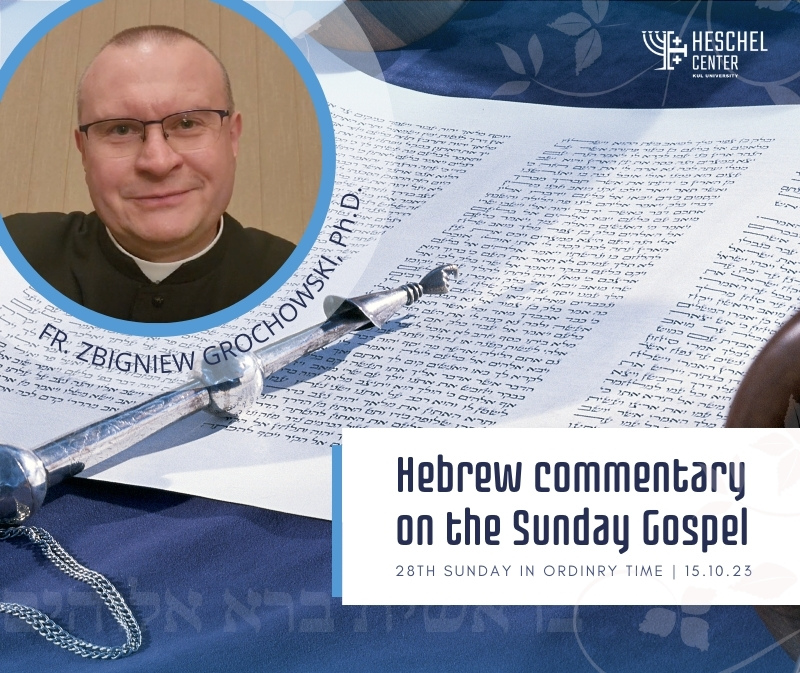The choicest feast – God’s promise shared by Christians and Jews
 God and God-inspired Biblical writers knew very well that an image of a feast will be a powerful incentive for the followers of Judaism and Christianity who seek salvation, observes Bible scholar Fr. Dr. Zbigniew Grochowski in a commentary for the Catholic University of Lublin Heschel Centre for the Sunday, October 15, stressing the symbolic meaning of the feast in the tradition of both Old and New Testament, symbolic of the heavenly banquet of the saved ones.
God and God-inspired Biblical writers knew very well that an image of a feast will be a powerful incentive for the followers of Judaism and Christianity who seek salvation, observes Bible scholar Fr. Dr. Zbigniew Grochowski in a commentary for the Catholic University of Lublin Heschel Centre for the Sunday, October 15, stressing the symbolic meaning of the feast in the tradition of both Old and New Testament, symbolic of the heavenly banquet of the saved ones.
Already in the Old Testament, the prophet Isiah among others referred to a feast, symbolic of the universal aspect of salvation. An invitation to this feast was sent to “all people and all nations” (Is 25:6-10a). A free invitation, however, does not imply inaction on the part of those invited. “Although the King’s generosity testifies to the gratuitousness of His grace and the greatness of His gift, if a person wishes to take advantage of it, they must appropriately respond to this invitation and accept it with gratitude oraz prepare for the feast by securing a wedding dress as one wild not be able to sit at table without donning it (Mt 22:11-14)”, observes Fr. Grochowski.
The “rich food and choice wines” (Is 25:6) which Isaiah mentions make up an image of magnificence of the heavenly feast. “Naturally, what is meant here is not the relishing of earthly appetite. In reality, the prophet talks about eschatological happiness, which is present not only in the image of the feast, but also expressed in the truth about the definitive annihilation of death and cancellation of all woe, ignominy, and tears” (Is 25:8), stresses the Bible scholar.
In Jesus’ parable in chapter 22 of the Gospel according to Matthew, we see God as a King, extending an invitation to his Son’s wedding to a first group/circle of people, especially welcome at a reception. As Fr. Zbigniew Grochowski, “their resentment and contempt provoke the King’s anger and inspire him to broaden the circle of those treated as guests: now the King’s servants make it possible for literally ‘all, good and bad alike’” (Mt 22:9-10) to attend the feast.
God’s unparalleled generosity calls for a generous response on the part of the invited person. “Man, for his part, must demonstrate his openness to God's invitation and his willingness to cooperate with the grace extended. This is symbolically expressed in the need to prepare a wedding garment, which in Scripture symbolises the intrinsic dignity of the human person”, notes the Bible scholar, pointing to the wedding garment as a symbol of purity of heart and a guarantee of entry into the King’s feast. Importantly, this garment does not only signify freedom from sins, but above all the possession of good works. “The Lord offers a free gift of grace, but it must be matched by a positive response from man, expressed not only in a verbal declaration of acceptance, but also in active cooperation, the fruit of which will be good works that fulfil God's will”, concludes Fr. Zbigniew Grochowski.
The full text of the commentary follows
The eschatological feast in the Kingdom of God: we need to respond to the gift of grace (“God’s invitation”) with readiness and cooperation (“a wedding garment” – good deeds).
Already in the Old Testament the promise of salvation was universal. The prophet Isaiah foreshadows an eschatological feast to be attended by “all peoples and nations” (Is 25:6-10a). Like the king from the parable in the Gospel, God invites all, those closer and more distant, good and bad alike, to the wedding of His Son (Mt 22:1-10). Although the King's generosity testifies to the gratuitousness of His grace and the greatness of His gift, if (!) a person wishes to take advantage of it, they must appropriately respond to this invitation and accept it with gratitude oraz prepare for the feast by securing a wedding dress as one wild not be able to sit at table without donning it (Mt 22:11-14).
An eschatological feast
God and God-inspired Biblical writers knew very well that an image of a feast will be a powerful incentive for the followers of Judaism and Christianity who seek salvation. The prophet Isaiah, when describing YHWH’s preparation of a feast on Mount Zion in Jerusalem (cf. Is 24:23; 25:6.10a) urges all to arrive at the Holy Place to glorify God and rejoice at His salvation (Is 25:9).
An incentive to arrive in Jerusalem is, among others, the “rich food and choice wines” (Is 25:6). Naturally, what is meant here is not the relishing of earthly appetite. In reality, the prophet talks about eschatological happiness, which is present not only in the image of the feast, but also expressed in the truth about the definitive annihilation of death and cancellation of all woe, ignominy, and tears (Is 25:8). Furthermore, he announces the destruction of the veil that veils all peoples (Is 25:7), which may be a reference to mourning (cf. 2 Sam 15:30; 19,5; Jer 14:2-3; Esth 6:12), although he refers rather to events connected with Moses, who spoke “face to face” with the Lord: this made his face shine and that is why Moses had to put a veil on his face (cf. Ex 33:11; 34:34). This means that Isaiah prophesies the full revelation of God and man's capacity to receive it. As a result, in the life to come there will no more obstacle to our desire to cling to God, the Father and Maker of all creation (cf. Ex 24:10; Eph 2:18).
The wedding feast for the King’s Son
The parable from the Gospel according to Matthew (Mt 22:1-14) is a clear reference to the words from Isiah (Is 25:6-10a). We see God as a King, extending an invitation to his Son’s wedding to a first group/circle of people, especially welcome at a reception. Their resentment and contempt provoke the King's anger and inspire him to broaden the circle of those treated as guests: now the King's servants make it possible for literally ‘all, good and bad alike’” (Mt 22:9-10).
Gratuitous grace offered by God to all people, however, does not imply their inaction (let alone arrogant ingratitude). Man, for his part, must demonstrate his openness to God's invitation and his willingness to cooperate with the grace extended. This is symbolically expressed in the need to prepare a wedding garment, which in Scripture symbolises the intrinsic dignity of the human person. Just as nakedness (a sign of son) triggers embarrassment, the garment (a symbol of inner dignity) means the purity of heart and guarantees an entry into the King’s banquet.
In light of the New Testament, a garment means not only a pure heart (one free from sin, i.e. a negative aspect), but also a host of good deeds (a positive aspect) as the fruit of man’s coopeation with God’s grace (cf. Rev 19:8). Only a person prepared in this way, invited by God to the wedding for His Son, will be able to take part in it. The Lord offers a free gift of grace, but it must be matched by a positive response from man, expressed not only in a verbal declaration of acceptance, but also in active cooperation, the fruit of which will be good works that fulfil God's will.
About the Author
Rev. Zbigniew Grochowski, Ph.D. - a specialist in biblical sciences and archaeology, a graduate of Rome's Pontificium Institutum Biblicum and Jerusalem's Studium Biblicum Franciscanum, assistant professor in the Department of New Testament Exegesis of the Department of Biblical Sciences of the Faculty of Theology of Cardinal Stefan Wyszynski University in Warsaw, focuses on the Writings of John and the topic of the disciples of Jesus, lecturer at the Higher Theological Seminary in Elblag, ordinary member of the Association of Polish Biblical Scholars and the Ex-Alunni PIB Association.
Heschel Center of the Catholic University of Lublin












